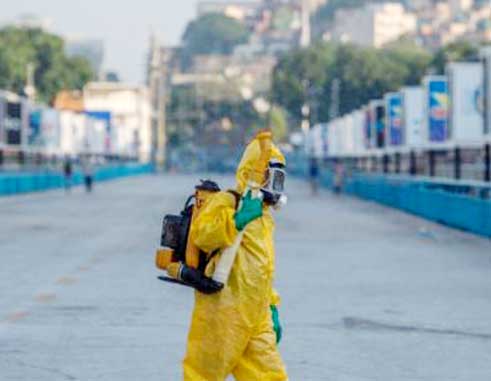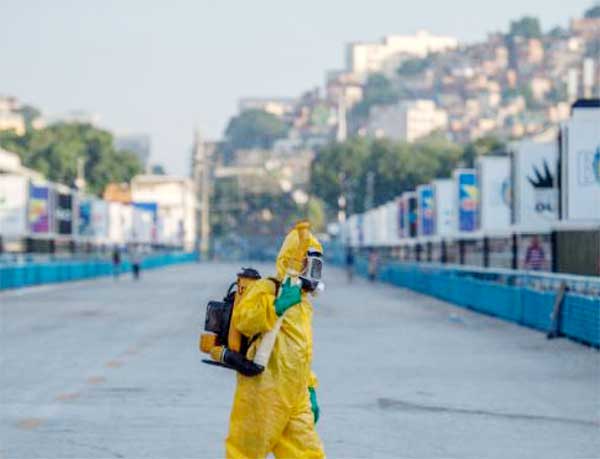 ON Monday February 1, the World Health Organization (WHO) declared the Zika virus, transmitted by the Aedesaegypti mosquito, an international public health emergency. The announcement follows the declaration by Brazil of a national public health emergency. An outbreak of the Zika virus was detected last year in Brazil. The virus has since been found in several countries in Latin America and, more recently, in North America. The main concern is over the virus’s link to microcephaly, a congenital condition where a child is born with a smaller than normal head size and impaired brain development.
ON Monday February 1, the World Health Organization (WHO) declared the Zika virus, transmitted by the Aedesaegypti mosquito, an international public health emergency. The announcement follows the declaration by Brazil of a national public health emergency. An outbreak of the Zika virus was detected last year in Brazil. The virus has since been found in several countries in Latin America and, more recently, in North America. The main concern is over the virus’s link to microcephaly, a congenital condition where a child is born with a smaller than normal head size and impaired brain development.
The WHO declaration will allow for better coordination of actions and mobilization of the necessary funding in a global effort aimed at preventing the spread of the virus, as well as speeding up the research to develop a vaccine and new therapeutic drugs. Despite the real public health risk, it is important to avoid misinformation. At this point, there is no reason to cancel business or pleasure trips, but extra precautions must be taken by pregnant women, who should talk to a doctor before travelling to the most affected areas.
The Zika is not a new Ebola, its symptoms being similar to a mild flu in adults. The Zika virus is of course a matter of concern, given association with microcephaly in newborn babies. More data and standardized protocols are needed before the link – first discovered by Brazilian doctors – between the virus and such cases of abnormally small heads and brain damage can be fully clarified.
Microcephaly in newborn babies can also be caused by a number of other diseases. Health experts are dealing with something new: the link between Zika and microcephaly is unprecedented in the scientific literature and requires in-depth studies and analyses – which are already underway – both to find out what is really happening and to determine the risk level for pregnant women.
The Brazilian Ministry of Health is currently investigating 3,670 suspected cases of microcephaly in the country. According to the latest information released on February 2, 404 diagnoses of microcephaly were confirmed, of which 17 were linked to the Zika virus. Another 709 suspected cases of microcephaly had their diagnosis discarded. This in no way diminishes the seriousness of the risk, nor does it weaken the resolve of the Brazilian government to take action.
From a Brazilian perspective, this fight is global, regional, and national. Globally, the WHO will be the main coordinator of efforts in this fight to control the virus worldwide. On the regional level, Brazil is also in permanent contact with the Pan American Health Organization (PAHO) and regional partners, such as the United States.
At the domestic level, the Brazilian Government is seriously addressing this issue as a matter of utmost importance, not only in view of the Olympics but also because of its potential long-term impact on the Brazilian people. The federal government has launched a three-front National Plan to Combat the Aedes and Microcephaly: prevention and combat against the Aedesaegypti; health care and assistance to pregnant women and children; and research. All efforts are coordinated by the federal government in partnership with State and local governments.
In order to fight the vector of the infection, the mosquito, the Brazilian Government has deployed 220,000 troops and 300,000 health agents, who are visiting communities to educate the population and help eliminate all mosquito breeding grounds.
Insecticides and larvicides, as well as repellents, are also being employed as traditional weapons that proved efficient in the past. The mobilization also involves the civil society, schools, NGOs and other public and private institutions in a broad-based alliance to raise public awareness about the infection and prevent the spread of the disease.
Apart from these more traditional strategies and the efforts to strengthen its healthcare network, Brazil is investing in technology and research to develop a vaccine and new therapies. A genetically modified mosquito, now under trial, could offer a new and promising weapon. Our national public health institutions are reaching out to their partners abroad to strengthen the research network and develop more efficient diagnostic kits, antiviral drugs and a Zika vaccine.
In Brazil, the Butantan, Chagas, Pasteur, and FioCruz Institutes operate as leading world-class institutions with vast experience in tropical diseases and a successful record in technological development. All the available expertise and manpower of these and other organizations is now directed towards this fight, in cooperation with international partners. The private sector, especially drug companies, is also investing in research into new and innovative ways to defeat the virus. This is an emergency, but Brazil and the world have the know-how and are able to muster the human and material resources to meet the challenge.
As Brazil prepares for the Olympics in August, authorities are working hard to rid the Rio de Janeiro region and the whole country of Aedisaegypti mosquitoes. Moreover, the Olympics will take place during winter in the Southern Hemisphere, a period of cooler temperatures, which usually contribute to a sharp decrease in mosquito-borne illnesses.
— Sergio Couri is Ambassador of Brazil to Saint Lucia and OECS”






![Simón Bolívar - Liberator of the Americas [Photo credit: Venezuelan Embassy]](https://thevoiceslu.com/wp-content/uploads/2025/12/Simon-Bolivar-feat-2-380x250.jpg)



